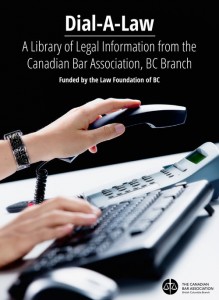CBABC’s Dial-A-Law Scripts come to Clicklaw Wikibooks
Clicklaw, Courthouse Libraries BC (CLBC) and LawMatters are very pleased to let the public and legal information community know that the Canadian Bar Association BC Branch’s long-serving Dial-A-Law scripts are now on Clicklaw Wikibooks. They join a growing library of content from other key producers of  public legal information, including People’s Law School, TRAC, BC CEAS and others including some authors CLBC helped to publish, such as Cliff Thorstenson and John-Paul Boyd. The collection of scripts will be printed in a 500+ page book to be shipped to public libraries in BC, at no cost to the libraries, in conjunction with the LawMatters program.
public legal information, including People’s Law School, TRAC, BC CEAS and others including some authors CLBC helped to publish, such as Cliff Thorstenson and John-Paul Boyd. The collection of scripts will be printed in a 500+ page book to be shipped to public libraries in BC, at no cost to the libraries, in conjunction with the LawMatters program.
CLBC and CBABC announced this news by formal press release yesterday (April 14, 2015). It’s exciting since Dial-A-Law scripts are perhaps the longest-surviving example of the BC legal profession’s dedication to helping the public with free legal information. The scripts cover over 130 legal topics, and have existed in various formats for over 30 years. Dial-A-Law started in 1983 with help from the BC Law Foundation and its scripts have been edited by volunteer lawyers ever since. More information about the various ways you can access Dial-A-Law is on Clicklaw’s page for the service.
Yesterday’s announcement is significant because now the scripts are even more accessible. Clicklaw Wikibooks are all about keeping legal information in a single spot so that editors and lawyers can update it—this is one of the benefits of a Wikipedia-style platform—but letting the end user choose whether to print, read online, or otherwise export the content in a way that meets their needs. Users can download whole contents, or only portions, of Clicklaw Wikibook in PDF or EPUB. They can order a printed book for cost, or read it online. Continue reading


